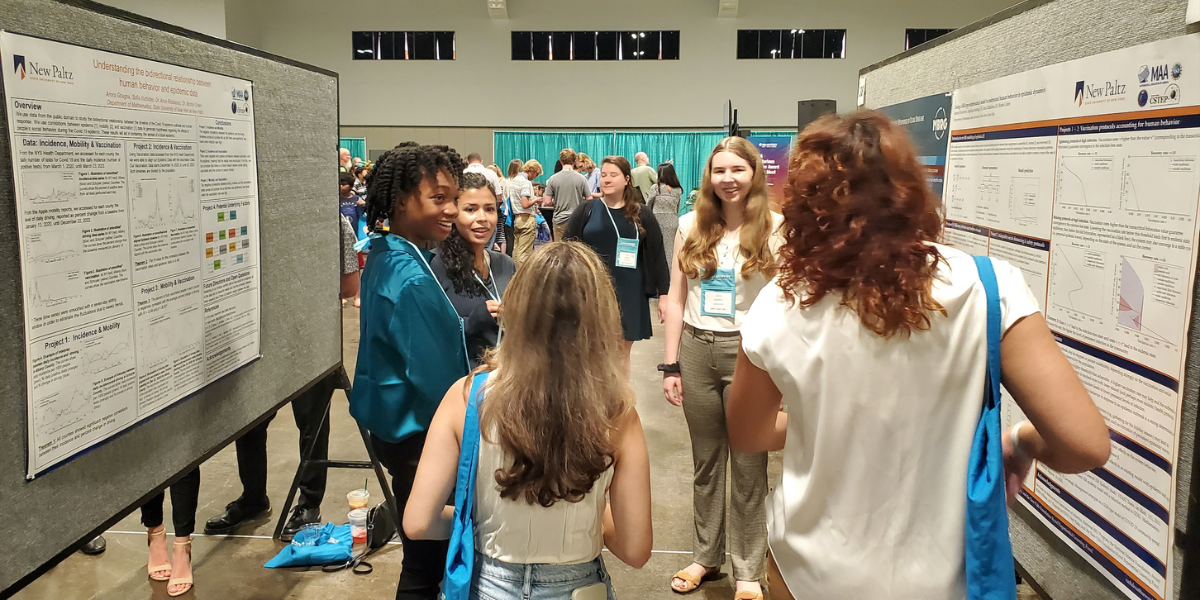- About MAA
- Membership
- MAA Publications
- Periodicals
- Blogs
- MAA Book Series
- MAA Press (an imprint of the AMS)
- MAA Notes
- MAA Reviews
- Mathematical Communication
- Information for Libraries
- Author Resources
- Advertise with MAA
- Meetings
- Competitions
- Programs
- Communities
- MAA Sections
- SIGMAA
- MAA Connect
- Students
- MAA Awards
- Awards Booklets
- Writing Awards
- Teaching Awards
- Service Awards
- Research Awards
- Lecture Awards
- Putnam Competition Individual and Team Winners
- D. E. Shaw Group AMC 8 Awards & Certificates
- Maryam Mirzakhani AMC 10 A Awards & Certificates
- Two Sigma AMC 10 B Awards & Certificates
- Jane Street AMC 12 A Awards & Certificates
- Akamai AMC 12 B Awards & Certificates
- High School Teachers
- News
You are here
Outreach Grantee Highlight: SUNY New Paltz
The MAA Programs Team is excited to announce our new Grantee Highlight Stories series! Over the next few months, we will be highlighting some of our amazing grantees and all that they have accomplished with MAA funding. Check out our previous stories on Tensor SUMMA awardee University of Guam and Tensor Women awardee Worcester Polytechnic Institute.

In April 2020, the mathematics department at State University of New York (SUNY) New Paltz started engaging their students in epidemic modeling research as part of the fast-acting response of the scientific community to the COVID-induced crisis. The resulting projects produced highly visible peer-reviewed research that impacted an emerging understanding of a complex epidemic system and potentially helped inform the community response. A central question from these earlier research projects took shape: How does human behavior interact with the virus?
SUNY New Paltz Associate Professor Dr. Anca Radulescu and Assistant Professor Dr. Moshe Cohen were awarded a grant through the MAA’s 2023 National Research Experiences for Undergraduates Program (NREUP) to support two summer research projects for four of their students to address this question. NREUP is a longstanding MAA program that offers financial support for undergraduate mathematics faculty to run research experiences for undergraduate students from minoritized backgrounds who have historically been underrepresented in the field of math to mentor students in meaningful research at a critical point in their career path.
The first of the two projects searched for data patterns supporting correlations between COVID incidence and different population behaviors around social distancing, travel, and vaccination. The second project laid out a Susceptible-Infected-Recovered (SIR) model relating these factors to understand the mechanisms behind the data-driven trends. Working on open-ended interdisciplinary problems allowed the students to practice creative problem-solving and guide their learning and through that nonlinear process, they encountered some surprising results. For example, the students in the data-driven study realized that while at the national level there were high state-wide correlations with density, household income, political affiliation, and socio-economic demographic data, they did not find these to hold at a county-by-county level within New York state. Ultimately, both of these projects advance our understanding of the importance of community behavior during an epidemic outbreak, and more generally, in a time of crisis.
The success of these projects was facilitated by a well-structured program that empowered students and fostered a strong sense of community among them, as well as the broader groups of STEM summer researchers at the university, and the wider science community. Students participated in virtual invited talks with other investigators in epidemic modeling and mathematical biology and attended weekly sessions with an already-existing locally-run summer research program. These opportunities and this program helped one of the students solidify a career interest in data science. She said, "Through this experience, I was able to truly see how analyzing data can help to make better decisions for the future. Being able to transform raw data into a story has enforced my interest in pursuing a career in Data Science. I am very grateful to have not only been a part of this project but also presented the opportunity."
After concluding the summer research experience, students traveled to Tampa for MAA MathFest 2023, thanks to the support of NREUP funding. They showcased their expertise in an undergraduate poster session in which two of them won an Outstanding Poster Award and the Janet L. Andersen Award. The opportunity to attend a national conference was an amazing opportunity and is truly only one part of the larger benefits of hosting an NREUP program. In reflecting on the advantages of the NREUP program, Dr. Radulescu and Dr. Cohen said, “ The best thing about the MAA’s NREUP is that it benefited our students: math majors we’ve had in classes and knew well already, as opposed to selecting students nationally for an NSF REU. Although our medium-sized, regional public university values and supports undergraduate research, our students received substantially more summer support through NREUP than they would have received internally. Many of our math majors have other obligations, including family and work, and some are unable to leave the region for a whole summer, and the NREUP allowed our students to spend the summer focusing on research.”
If you are interested in applying for an NREUP grant, applications are now open and due Friday, January 26, 2024. Learn more about the NREUP program at maa.org/nreup.




